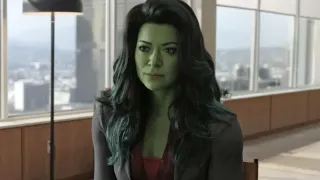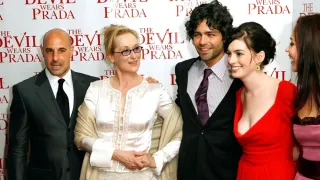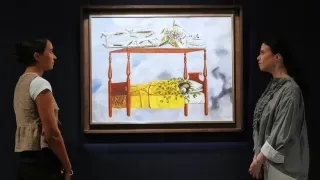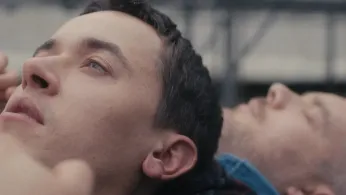
2 hours ago
Russell Tovey and Tom Blyth on Building Trust, Embracing Vulnerability, and Bringing Carmen Emmi’s Vision to Life in ‘Plainclothes’
Steve Duffy READ TIME: 4 MIN.
Set in 1990s Syracuse and featuring breakout performances from stars Tom Blyth and Russell Tovey, director Carmen Emmi’s Sundance award-winning thriller follows a promising undercover officer (Blyth) assigned to lure and arrest gay men who defies orders when he falls in love with a target (Tovey). At his mother’s New Year’s Eve party Lucas, a young police officer, loses a letter no one was ever meant to read. Amid the backdrop of the suffocating family party, the search for the letter unlocks memories of a past he’s tried to forget: months earlier, while working undercover in a mall bathroom, Lucas arrested men by seducing them. But when he encounters Andrew, everything changes. What begins as another setup becomes something far more electric and intimate. As their secret connection deepens and police pressure to deliver arrests intensifies, Lucas finds himself torn between duty and desire. With time running out and his past closing in, ‘Plainclothes’ builds toward a New Year’s Eve reckoning where everything he’s buried threatens to erupt.
EDGE sat down with Russell Tovey and Tom Blyth and chatted about what drew them to Plainclothes, how they built trust on set, and the unexpected ways they connected to their characters.”
EDGE: Plainclothes has a gritty, stripped-down realism. What drew each of you to this project in the first place?
RT: Minimal, but concise. I thought I wanted to say those words in the script after reading it. Also, the energy of Carmen after meeting him. As a director and writer, I felt emboldened to follow him wherever he would lead us. Then I met Tom on a Zoom meeting, and we had instant chemistry. When we read together, it sparkled right away. So, it was an easy project to jump right into.
TB: And all of that, plus it is Carmen’s debut feature, and I can't believe this is his debut feature, and we get to be a part of it. It's so bold, brave, and personal. He executes it with such vision. I felt from day one that we were getting on board with someone who would make amazing work for years to come. And to be there in the beginning is a very cool and honoring experience. I feel humbled to have the privilege of being a small part in bringing his vision to life.
EDGE: Did you find yourself relating to your characters in unexpected ways?
TB: I think I always do. I think even if I go into it thinking or seeing differences more than the similarities between me and a character, by the end, I always feel like I am that person. Not in a I'm super method kind of way, but in a way where you have to fall in love with your character in order to bring truth to them and to play all the nuances and all the humanity of them. As Lucas, I could relate to him in all of his anxiety and in all the ways he hides himself. I think we've all done that at some point for various reasons. I fell in love with the character, and so I found it easy to relate to him; I often took him home with me. He is in a very anxious state, and he's hiding himself from a lot of people. I'd go to my hotel room at the end of filming and feel pretty isolated and anxious, which I would then carry over into the next day. However, I was working with people I loved and had a great time on set, so it was a balancing act that I had to navigate.
RT: The character's emotions, which we see as negative. We're so lucky as artists that we can use them to tell stories. When you are in that state, especially if you weren't invested in this production, you would try to get yourself out as quickly as possible. You try to calm your nervous system and self-soothe or speak to a therapist talk about it. But when you're doing these productions, when those emotions take over, there's something quiet and cathartic about it, but there's also something quite barbaric about holding onto them because you know that they're going to be worthy for the story, but you also have to know when to shake them off. I think that's an act of generosity that actors who want to tell these stories have to put themselves through to achieve honesty.
I definitely connected to my character, especially growing up gay and not wanting to be gay, and the shame that comes with that. I am of a certain age, and I'm my character’s Andrew's age, obviously. I was born in 1981, so I felt that shame, and I’ve been around the community and disease. I have had the knowledge and inherited trauma of what has gone on for our community and continues to go on. I played Joe Pitt in Angels in America, who is a repressed, internally homophobic, and religious man who's married. There was a lot to that character, and I was able to cherry-pick some of Joe Pitt’s characteristics along with my own biography and put all that into Andrew.
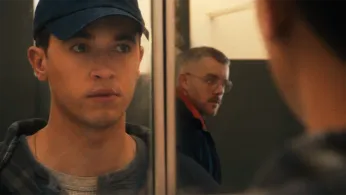
Source: Magnolia
EDGE: Tell us about the trust that was required to portray such vulnerable characters.
TB: We needed a bucket full of trust, but I think we had it pretty quickly. We got in the room, calm and gracious, and with a bit of rehearsal time, we got in and started playing immediately. The first scenes we filmed were our first meeting, which was very flirtatious and featured a lot of eye contact, setting the stage for the scene just outside the movie theater, which was a lot of fun. I think that was one of the first we rehearsed, and there's just a beautiful kind of fizzling chemistry in the script that we were able to just play with on day one. So, trust was super necessary. We had had an amazing intimacy coordinator, Joey, who really helped us find that trust in the physical stuff. I think they allowed us to be playful, but also made us feel like we had support. We had someone who would tell us If you feel awkward here, you can choreograph it this way. Carmen just endows the whole process with trust because you rally around him. I've never seen a crew rally around a director like they did around Carmen. Everyone trusted that Carmen had a vision, and we all trusted in the process.
EDGE: Was there a moment on set where you surprised each other as scene partners?
RT: Every day with Tom was a surprise. Every day was wow. Intimacy is such a crazy thing that we do in our job to go and fall in love on screen and have sex with someone in front of a crew. It's not real sex, but simulated sex. As an actor, you have to commit to that, but you also have responsibility for the person you're doing it with. I was so inspired by how open Tom was to experiencing these scenes in the most authentic, honest, loving, and exciting ways. Nothing is worse than doing these things and feeling resistance from the person you're with, or feeling uncomfortable, which prevents you from giving your best work. I feel like we're constantly bouncing off each other and constantly asking each other, “What do you need?”
TB: The safety on set that is always talked about. It actually doesn't come from everyone tiptoeing around. I think we found that safe feeling quickly. The safety, especially in terms of intimacy, comes from both people knowing this is necessary to the story. It's necessary for the characters. It's beautiful, and then you boldly jump in and be vulnerable together. It stems from choosing to be vulnerable, which I believe is growing increasingly difficult in the society we live in.
EDGE: What do you hope audiences walk away feeling after seeing Plainclothes?
RT: So many things. Obviously, we want them to walk away and say, ”That was a fucking great film.” I want these characters to live beyond this film. I hope the audience will care about where they go next, what they're up to. That's the sign of great writing because you want these characters to live within you. I want people to feel entertained and moved. Queer cinema is more important than ever. I want this to represent people, but also I want it to humanize what's being demonized
TB: I want people to feel seen. If just a few people watch this film and feel seen, it's a testament to the power of representation. They may feel like they've been seen in a way that they're not always seen in their day-to-day life. You've done something amazing if you can create a piece of art or a film, even if just a few people see it and think, 'I feel like someone recognized me in my life or I was reflected on screen.' That's an amazing thing. We've already received hundreds of messages from people and feedback on the film from those who feel it represents them in one way or another. It’s an amazing feeling, especially when you're making something you don't even set out to do. You just set out to make a good film, and after it's released and people are seeing it, only then do you realize you've done something that actually touches people. It's a humbling and gratifying experience.
"Plainclothes" Opens In Theaters September 19, 2025
https://www.magpictures.com/plainclothes/
